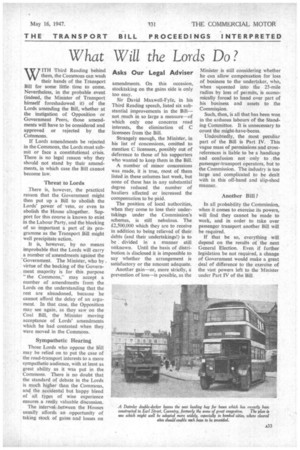What Will the Lords Do?
Page 43

If you've noticed an error in this article please click here to report it so we can fix it.
Asks Our Legal Adviser WITH Third Reading behind them, the Commons can wash their hands of the Transport Bill for some little time to come. Nevertheless, in the probable event (indeed, the Minister of Transport himself foreshadowed it) of the Lords amending the Bill, whether at the instigation of Opposition or Government Peers, those amendments will have to be considered and approved or rejected by the Commons.
If Lords amendments be rejected in the Commons, the Lords must submit or face a constitutional crisis. There is no legal reason why they should not stand by their amendments, in which case the Bill cannot become law.
Threat to Lords
There is, however, the practical reason that the Government might then put up a Bill to abolish the Lords' power of veto, or even to abolish the House altogether. Support for this course is known to exist in the Labour Party, and the blocking of so important a part of its programme as the Transport Bill might well precipitate action.
It is, however, by no mean improbable that the Lords will carry a number of amendments against the "Government. The Minister, who by. virtue of the backing of the Government majority is for this purpose "the Commons,' may accept a number of amendments from the Lords on the understanding that the rest are abandoned, because he cannot afford the delay of an argument. In that case, the Opposition may see again, as they saw on the Coal Bill, the Minister moving acceptance of Lords' amendments which he had contested when they were moved in the Commons.
Sympathetic Hearing
Those Lords who oppose the gill may be relied on to put the case of the road-transport interests to a more sympathetic audience, with at least as great ability as it was put in the Commons. There is no doubt that the standard of debate in the Lords is much higher than the Commons, and the accidental but happy blend of all types of wise experience ensures a really valuable discussion.
The interval between the Houses usually affords an opportunity of taking stock of gains and losses on amendments. On this occasion, stocktaking on the gains side is only too easy.
Sir David Maxwell-Fyfe, in his Third Reading speech, listed six substantial improvements in the Bill— not much in so large a measure—of which only one concerns road interests, the elimination of C licensees from the Bill.
Strangely enough, the Minister, in his list of concessions, omitted to mention C licensees, possibly out of deference to those of his supporters who wanted to keep them in the Bill.
A number of minor concessions was made, it is true, most of them listed in these columns last week, but none of these has in any substantial degree reduced the number of hauliers affected or increased the compensation to be paid.
The position of local authorities, when they come to lose their undertakings under the Commission's schemes, is still nebulous. The £2,500,000 which they are to receive in addition to being relieved of their debts (and their undertakings!) is to be : divided in a manner still unknown. Until the basis of distribution is disclosed it is impossible to say whether the arrangement is satisfactory or the amount adequate.
Another gain—or, more strictly, a prevention of loss—is possible, as the Minister is still considering whether he can allow compensation for ' loss of business to the undertaker, who, when squeezed into the 25-mile radius by loss of pel mits, is economically forced to hand over part of his business and assets to the Commission.
Such, then, is all that has been won in the arduous labours of the Standing Committee. It is unnecessary to count the might-have-beens.
Undoubtedly, the most peculiar part of the Bill is Part IV. This vague mass of permissions and crossreferences is liable to be a handicap and confusion not only to the passenger-transport operators, but to the Commission. The industry is too large and complicated to be dealt with in this off-hand and slip-shod manner.
Another Bill ?
In all probability the Commission, when it comes to exercise its powers, will find they cannot be made to work, and in order to take over passenger transport another Bill will be required.
If that be so, everything will depend on the results of the next General Election. Even if further legislation be not required, a change of Government would make a great deal of difference to the exercise of the vast powers left to the Minister under Part IV of the Bill.












































































